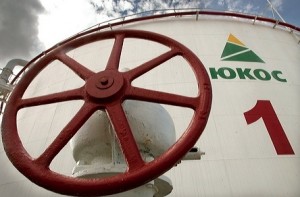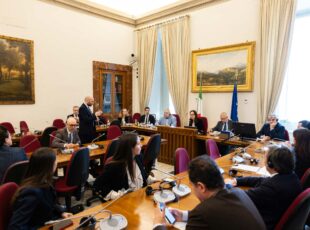Former Yukos Executives Comment on the 20th Anniversary of Company
 April 15, 2013 marks the twentieth anniversary of the founding of the Yukos Oil Company, by Russian government decree in 1993. Yukos went on to become the largest, best governed, most transparent and most profitable oil company in Russia. Following the arrest of its CEO, Mikhail Khodorkovsky, on trumped-up charges in October 2003, however, Yukos was systematically destroyed. After a forced bankruptcy and rigged liquidation auctions, the majority of its assets were appropriated by Rosneft, the Russian state oil company.
April 15, 2013 marks the twentieth anniversary of the founding of the Yukos Oil Company, by Russian government decree in 1993. Yukos went on to become the largest, best governed, most transparent and most profitable oil company in Russia. Following the arrest of its CEO, Mikhail Khodorkovsky, on trumped-up charges in October 2003, however, Yukos was systematically destroyed. After a forced bankruptcy and rigged liquidation auctions, the majority of its assets were appropriated by Rosneft, the Russian state oil company.
Bruce Misamore, the former Chief Financial Officer of Yukos, commented that:
“Yukos was founded by an official decree of the Russian government in 1993. It was taken back by the Russian government through the Russian government’s official corruption. The Russian government under Vladimir Putin stole Yukos and everybody knows it.
Yukos had been transformed into the most transparent, best-governed and most profitable oil company in Russia. The European Court of Human Rights has ruled that illegal Russian government and court actions led to its forced bankruptcy. The bulk of Yukos was swallowed up by Russian state oil company Rosneft.
Some of the world’s leading oil companies, from ExxonMobil to BP, seem willing to turn a blind eye to Rosneft’s part in the taking of stolen goods. The fate of Yukos shows that official corruption and the abject absence of property rights, lack of an independent judiciary and void of a rule of law make investment in Russia extremely risky.
Yukos itself is not the only example. Other cases have included the tax fraud against Hermitage Capital, exposed by the lawyer Sergei Magnitsky, who then paid with his life during detention for his efforts. Yukos-related persons including Mikhail Khodorkovsky and Platon Lebedev remain improperly incarcerated. Still others like Svetlana Bakhmina and Vasily Alexanyan were improperly imprisoned, and Vasily died as a result of the lack of treatment during his imprisonment. The theft of Yukos remains the biggest of its kind ever – and if Russia is able to steal a company of such size and scale, then no company is safe from Vladimir Putin, Igor Sechin and their corrupt cronies.”
Ariel Cohen, an expert in Russia and international energy policy at the Heritage Foundation in Washington, D.C., commented on the success of Yukos, amid difficult circumstances, under the leadership of Mikhail Khodorkovsky, who became CEO of the company in 1996. Mr. Cohen said:
“Khodorkovsky and his team fundamentally restructured Yukos, the Soviet-era company which was in nearly $3 billion of debt in 1996. At the time, Khodorkovsky and his partners accomplished an unprecedented feat, importing to Russia the most advanced management, technology, and accounting standards. Yukos became the most successful and fastest-growing oil company in Russia, setting new standards for transparency and paying billions of dollars in taxes. Yukos made its shareholders happy, too. Western investors, including super-majors Exxon and Chevron, courted Yukos, which political leadership resented. Khodorkovsky and the Yukos team were then prosecuted on trumped-up charges, in some cases twice for the same alleged crime, and jailed for long terms. That was their ‘reward’ for being business trailblazers in Russia.”
Referring to the fate of Yukos, Cohen said:
“The Russian state violated the rule of law by expropriating Yukos from Khodorkovsky and other shareholders, who suffered losses in the tens-of-billions of dollars. Prosecutors destroyed Khodorkovsky’s life and imposed confiscatory losses on thousands of investors. Tragically, there was no recourse in Russian courts. This remains a cautionary tale for anyone who wants to invest in Russia.”
A number of Russian Yukos executives, including some who suffered imprisonment on trumped-up charges, also offered reflections on the company’s twentieth anniversary, on the khodorkovsky22.ru website. Alexei Kurtsin, the former acting manager of Yukos Moscow who was sentenced to almost 8 years, in his first interview after release stated:
“The essence of my memories of my time working for Yukos is that it was interesting – I remember that Mikhail Borisovich [Khodorkovsky] was very fond of information technology, thus many innovative projects were being introduced, which contributed to education and self-development of its employees.
The meaning of the date of April 15 for me is that I was involved in the events of national importance. I want to wish for everyone who worked for Yukos that they use their experience of this company’s potential and the knowledge they gained there for self-development, successful projects and self-realisation in life. There is no doubt they all deserve it.”
The former executive vice-president of Yukos-EP, Yuri Kopanev, commented:
“I miss those global challenges that we faced in Yukos. When we achieved something, it brought great joy. I miss that. The main principle of our work was transparency.
Even though our favourite company doesn’t exist anymore, all former Yukos employees remember it. I wish Mikhail Borisovich [Khodorkovsky] and Platon Leonidovich [Lebedev] good health and patience. I hope to see them soon.”
Vladimir Pereverzin, the former senior Yukos manager who spent over 7 years in prison, reflected on the impact that the last decade of injustice has had on Russia. He stated:
“I was imprisoned for a longer term than I was actually working for Yukos. If the Yukos case hadn’t happened, I think that Russia would have been a better place to live in. Because all this is not about only one company – it is all about the system, the government, which carries out anti-people policy affecting living standards.
The arrest of Mikhail Khodorkovsky and Platon Lebedev was shocking for me. It would have been easier to imagine an alien spacecraft landing in Red Square than Khodorkovsky’s arrest. Furthermore, I could never imagine my own arrest. Khodorkovsky and I were on completely different levels.”



